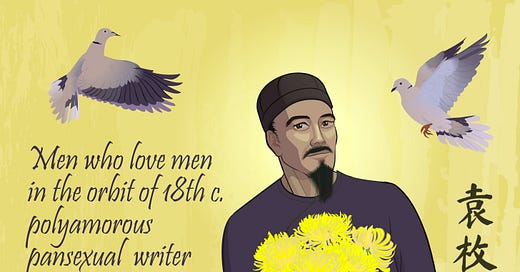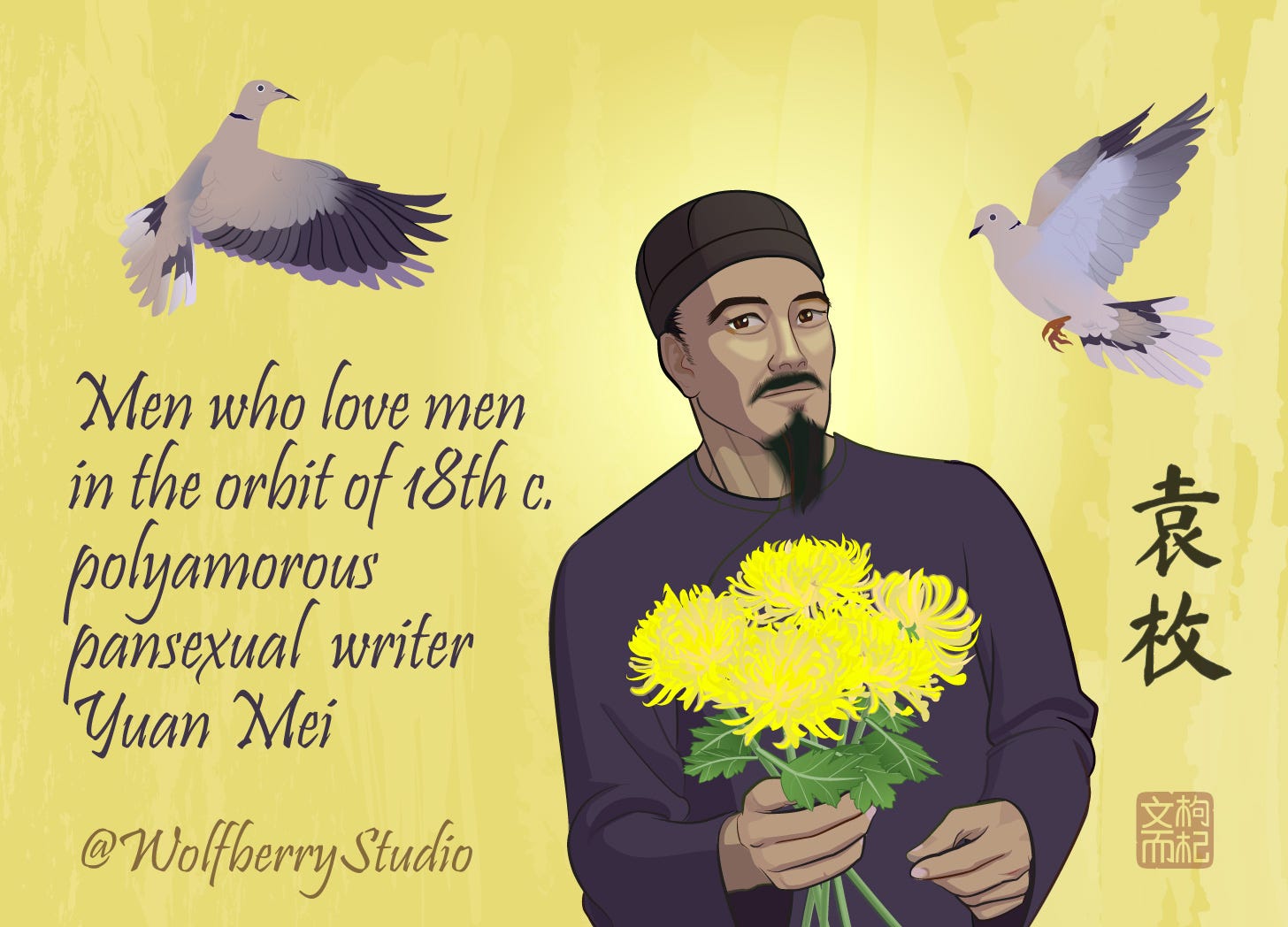Men who love men in the orbit of queer 18th century writer Yuan Mei
A community of bisexual/pansexual men and same-sex male couples supporting each other in 18th century China
In earlier posts, you have already met Yuan Mei, who bonded with Zheng Banqiao over their shared interest in male homoerotic beauty. Yuan Mei was a gastronome and writer who operated the Sui Garden, a well-known gathering place for people of literary talent, regardless of gender.
Yuan Mei recorded anecdotes about literati of his acquaintance together with essays on the aesthetics and theory of poetry.[1] Zheng Banqiao’s numerous homosexual affairs were mentioned in Yuan Mei’s Poetry Talks from Sui Garden, a 16-volume work published in 1790.
Yuan Mei wrote for/about multiple other men-who-love-men. He prefaced the 8th entry in Poems from Sui Garden, written around 1755, with the following homoromantic anecdote:[2]
Wen Jieshan, who once held a post in the Ministry of Personnel, loved the singer Wang Lang.[i] At that time, Wen’s younger brother was the County Magistrate of Shangyuan. Every time Wen Jieshan visited his lover, the magistrate felt that it reflected poorly on his office and was very embarrassed.
It so happened that Zhuang Niannong, who passed the Imperial Civil Service examination in the same year as Wen Jieshan, lived in a river house next to Wang Lang’s residence, much to Wen Jieshan’s delight. From time to time, he invited me and many well-known literati, including Wu Lancheng and Wang Qiuyu, to gather there for wine-and-poetry sessions. Wen composed 6 poems, personally wrote them in small Kai calligraphy, and placed them in Wang Lang’s sleeve. All the gentlemen and I composed the responding verses for each poem.
Wang Lang’s prompt contained the four words “the present life has passed”, hence the ending verse of the 6th poem.
Social context: There is NO reason to believe that County Magistrate Wen’s disapproval of his older brother’s relationship was motivated by homophobia. Performing artists had low social status regardless of their gender. Actors, musicians, and dancers of any gender were considered socially adjacent to sex workers, and there was some degree of overlap between the two classes. Female courtesans were trained primarily as performing artists but may also engage in some sex work.
In the short story Young Master Wei recorded by Qing era writer Pu Songling, a debauched young man made it his goal to bed every famous female courtesan, enraging his uncle who was a prominent government official. The uncle made every effort to put an end to these irresponsible heterosexual dalliances. While the uncle may have failed in his quest, karmic justice eventually caught up to the young man for his excessive appetites and exploitative behavior.
For European parallels, see the following articles about sexual exploitation of performing artists, including minors, from Elizabethan England to 21st century Russia:
Flowers of the Gutter: Ballet Companies as Brothels from Paris to Russia | The Weeklings
Sexual Exploitation Was the Norm for 19th Century Ballerinas - HISTORY
Exploitation of Elizabethan child actors revealed | University of Oxford
Anyway, back to Yuan Mei’s Poems from Sui Garden:
Yuan Mei’s own handwritten copy of 随园诗稿 Poems from Sui Garden is preserved in the collection of Zhejiang Library. Dr Zheng Xiaoyou of National Center for the Preservation of Antique Books wrote a series of articles about it in 2016. The original text of the homoromantic anecdote and the poem that followed is reproduced in her article Composing call-and-response poetry night after night – Part 9 of “Yuan Mei and his Poems from Sui Garden.”
Yuan Mei was also on friendly terms with the scholar Bi Yuan and his same-sex partner Li Guiguan, a famous male actor of female roles.[3] He expressed support for their relationship. They were a well-known same-sex couple of their time. More on Li and Bi in a future post.
Yuan Mei also had a favorite male student Liu Xiashang. Although the exact nature of Yuan and Liu’s relationship is unclear, Yuan Mei wrote poems about Liu’s bisexual dalliances.
More tales about Yuan Mei:
Queer gossip about the 18th century pansexual poet and gastronome Yuan Mei
An 18th century pansexual poet and his bisexual student – Yuan Mei and Liu Xiashang
Notes:
[1] 随园诗话(清代袁枚创作的诗歌美学和诗歌理论著作)_百度百科 (baidu.com)
[2] 连宵偏和国风诗——袁枚和他的随园诗稿(九)- 中国古籍保护网 (nlc.cn)
[i] Wang Lang 王郎 is an unambiguously masculine name. Wang is the surname. Lang means ‘man’.




